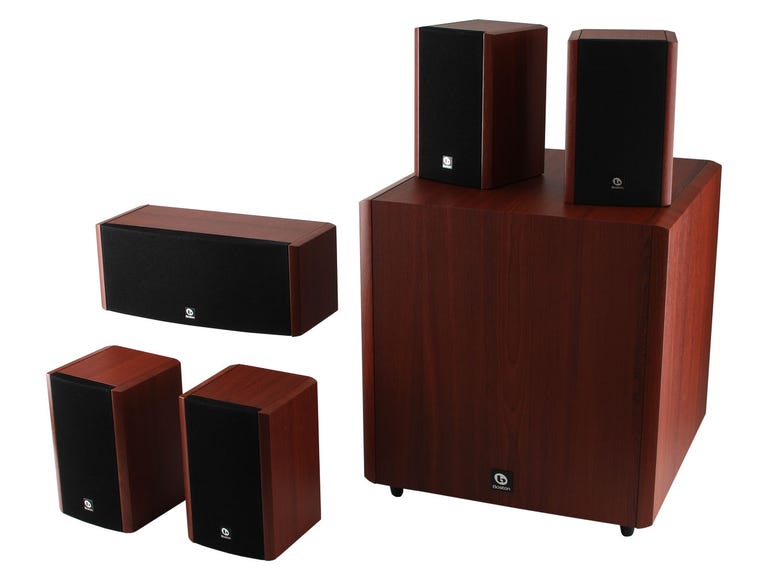 Why You Can Trust CNET
Why You Can Trust CNET Boston Acoustics CS2310 Classic review: Boston Acoustics CS2310 Classic
Boston Acoustics CS2310 Classic
It's easy to understand why speaker manufacturers are rushing to outdo each other by coming up with skinny, single-speaker surround systems. While these setups are more attractive and take up less space, traditional 5.1 speaker systems are by no means obsolete. Far from it, in fact. Consider Boston Acoustics' new Classic Series CS2310, which retails for $850: The satellite and subwoofer package trumps the single-speaker competition in almost every regard. Unfortunately, the system doesn't shine as much when it's a more apples to apples comparison with other similarly sized 5.1 systems. We liked the CS2310's crisp sound, but its home theater oomph was in short supply. Throughout our testing, the system failed to really immerse us in what we were viewing, unlike other 5.1 systems we've seen in the past.
The Good
The Bad
The Bottom Line
Design and Features
The six-piece (5.1) CS2310 speaker system comes with four compact CS23 satellites, one CS223C center-channel speaker, and the CS Sub 10 subwoofer. The package is offered in two vinyl-covered finishes: black walnut and cherry, each with removable, black-cloth grilles. The satellites and sub are available separately, and you can even add extra CS23 speakers (around $120 each) to fill out the surround channels of 6.1/7.1 systems.
The CS23 satellites are quite small, measuring a scant 7.75 inches high by 5 inches wide by 5 inches deep. The CS223C center is only slightly larger: 5 inches tall by 12.5 inches wide by 4.4 inches deep. The speakers can be placed on stands, shelves, or wall-mounted via the metal keyhole slots found on their rear panels. The medium-density fiberboard cabinets felt sturdy and well-built, but they're not as nicely finished as Energy's gorgeous piano-black RC-Micro 5.1 System.
The matching CS Sub 10 subwoofer is a rather plain-looking 15-inch cube. Even though it weighs a substantial 32 pounds, it sounded a little hollow and resonant when we wrapped our knuckles against the cabinet (that's not a good way for subs to sound). The attractive machine-metal panel on the sub's backside houses stereo and LFE inputs, rotary volume and crossover knobs, and phase- and power-control switches. We should note here that the connectivity options do not include speaker-level inputs or outputs.
That connectivity omission shouldn't be a problem, since most owners will use the CS Sub 10's LFE single-cable hookup with their AV receivers. That's what we did with our Denon AVR 1909 receiver, though we were sorry to see the CS2310 owner's manual didn't offer specific recommendations for a subwoofer-to-satellite crossover setting. We experimented with various crossover points, starting with 80Hz, but detected a "hole" in the bass response between the subwoofer and satellites. We tried higher and higher crossover settings and were finally satisfied with a 120Hz setting.
The CS23 speakers use just a single, 3.5-inch, DCD Graphite-injected polymer, mid-bass driver and a 1-inch Kortec soft-dome tweeter. The CS223C center speakers feature a pair of 3.5-inch, DCD Graphite-injected polymer, mid-bass drivers and the same 1-inch Kortec tweeter. The CS Sub 10 had a down-firing, 10-inch, DCD woofer and a built-in, 100-watt amplifier.
The Classic Series also includes the CS2300 5-channel surround-sound-system configuration, which goes for around $600. It's identical to the CS2310 we're reviewing here, but without the CS Sub 10 subwoofer.
Performance
Starting with the Come Together: A Night for John Lennon's Words and Music DVD, we were impressed with the CS2310's detailed sound. This live concert at Radio City Music Hall was shot just a few weeks after 9/11, so it's no surprise the performances have an emotional charge beyond what you'd get from just another all-star show. Shelby Lynne's gut-wrenching vocals tore up "Mother" with a full-throated wail. Alanis Morissette's "Dear Prudence" was only slightly less passionate, and the CS2310's unwavering clarity brought out the best in both performances.
The The X-Files: Fight the Future Blu-ray proved a tougher test. The scene in which agent Fox Mulder (David Duchovny) drives a huge tractor across the frozen Antarctic tundra revealed that the system's CS Sub 10 had a tendency to turn boomy and bloated when turned up loud. The helicopter crash and explosion in the Black Hawk Down Blu-ray overtaxed the CS223C and CS23 satellites, so the film's hard-hitting dynamics were reigned in more than we would have liked. Still, dialog intelligibility remained unfazed during even the most intense battle scenes and the enveloping surround mix of gunfire and mayhem was right on the money.
Unfortunately, we didn't have the Energy RC-Micro 5.1 System on hand to do a direct comparison, but we think that system would have held up better to Black Hawk Down's heavy-duty deep-bass assaults. That said--Boston's clearer, more-detailed overall sound is more "upfront" than that of the "laid-back" Energy system.
Rocking out with My Morning Jacket's Evil Urges CD, the CS2310 recovered somewhat, and the CS Sub 10's bass sounded potent. Still, the system sounded increasingly strained as we turned the volume up.
Overall, the CS2310 is no party animal and it will probably do its best work in smaller home theaters. It's certainly not a bad speaker system; just keep in mind that you can find similarly sized speaker systems for the money that'll deliver more home theater oomph.


